

Theconversation. As I watched the Women’s World Cup final recently with my family, my 11-year-old son, who plays on a local soccer team, remarked that he was amazed at how quickly and how often the US team scored.
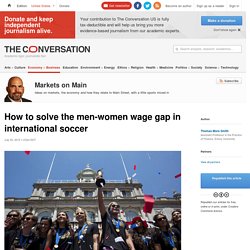
“Seriously, Dad, teams don’t just score like that in soccer.” Of course, he was right. The match set a record for most combined goals scored in a FIFA final for either men or women. It’s that level of action and excitement that made the game the most-watched soccer event in US history. The Nielsen overnight rating for the women’s final was 15.2, with more than 25.4 million viewers in the US. Shortly after the game, however, some took to Twitter to point out a less favorable disparity: Payout by FIFA to 2014 men’s champs Germany: $35 million. This is a shockingly huge pay gap, and looks even worse when considering that the US men’s team, which lost in the first round last year, earned US$9 million for their efforts.
Where do other sports stand? Where sports revenue comes from. Theconversation. Should professional female athletes be paid the same as their male counterparts?
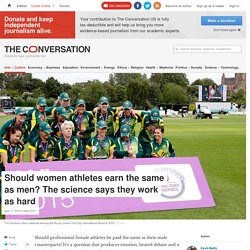
It’s a question that produces emotion, heated debate and a glaringly large glimpse into Pandora’s Box. We’ve had Novak Djokovic claim male tennis players should earn more because men’s matches get more spectators. Women’s bodies, he noted, “are much different than men’s bodies. They have to go through a lot of different things that we don’t have to go through. You know, the hormones and different stuff”. Australia’s women’s soccer team, the Matildas, went on strike over the question of pay last year. Most of the commentary we hear is just that, commentary. A balanced media? Not when it comes to gender. Opinion Updated While much is changing in the media sector, one thing never seems to: white, middle-aged men continue to dominate in front of the cameras and microphones.
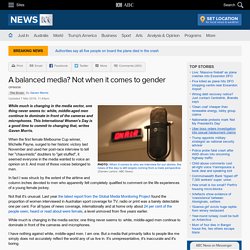
This International Women's Day is a good time to commit to changing that, writes Gaven Morris. When the first female Melbourne Cup winner, Michelle Payne, surged to her historic victory last November and used her post-race interview to tell her "chauvinistic" doubters to "get stuffed", it seemed everyone in the media wanted to voice an opinion on it. And most of those voices belonged to men. In fact I was struck by the extent of the airtime and column inches devoted to men who apparently felt completely qualified to comment on the life experiences of a young female jockey. Low Female Sports Coverage In Media Due To Gender Bias. Female American athletes get less coverage in the media due to gender bias and instead what attention they get focuses more on attire, or how attractive, sexy or ladylike they are, write Emily Kaskan and Ivy Ho of the University of Massachusetts Lowell in Sex Roles, an interdisciplinary behavioral science journal offering a feminist perspective.

Kaskan and Ho looked at how pervasive small subtle biases and stereotyping of American female athletes are and what types of "microaggression" exist, examining how they put pressure on athletes and other women, as well. They reviewed popular Internet articles and research from the Psychinfo database, using keywords such as 'sexism,' 'sports media,' 'Serena Williams' and 'Olympic coverage.' They conclude that media often portray female athletes as inferior to their male counterparts and are dismissive of their true abilities. Anna Kournikova. 2016 Gender Balance In Global Sport Report. Women in sport – What’s with the gap?
Imagine that your favourite AFL star had a twin sister...
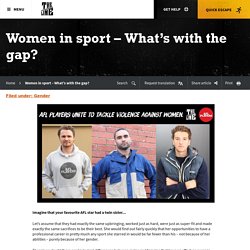
Let’s assume that they had exactly the same upbringing, worked just as hard, were just as super-fit and made exactly the same sacrifices to be their best. She would find out fairly quickly that her opportunities to have a professional career in pretty much any sport she starred in would be far fewer than his – not because of her abilities – purely because of her gender. There’s no doubt there are biological differences between males and females that have an effect on average times and strength. But sport is about more than speed and strength – if we were only interested in seeing the ‘fastest’ and ‘strongest’, we would race humans against cheetahs and watch them wrestling gorillas.
And keep in mind that the world’s best female athletes would annihilate the average man – even very fit ones. The average wage of a male AFL player is $265,179. Clearinghouse : Women's Sport. Introduction Australian and New Zealand sports organisations, and many other national sports bodies from around the world, recognise that the benefits of sport are best achieved when programs and opportunities are inclusive.

Gender should not be a limiting factor for participation in sport and other forms of physical activity. Key Messages Gender is a defining factor of sporting opportunities, funding and recognition. Gender equity in sport is part of an inclusive policy framework. Background. Women in sport: 'No real progress over sport gender gap' - BBC Sport. The Gender Equality Debate; Women in Sport. I am a big believer in gender equality and passionate about equal rights, equal pay and equal recognition, not only when it comes to our female athletes, but for women in general.
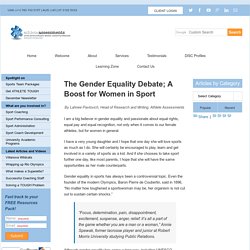
I have a very young daughter and I hope that one day she will love sports as much as I do. She will certainly be encouraged to play, learn and get involved in a variety of sports as a kid. And if she chooses to take sport further one day, like most parents, I hope that she will have the same opportunities as her male counterparts.
Gender equality in sports has always been a controversial topic. Even the founder of the modern Olympics, Baron Pierre de Coubertin, said in 1896, “No matter how toughened a sportswoman may be, her organism is not cut out to sustain certain shocks.” Women and Sport. Chapter 6 - Women's Sport and the Media. Introduction 6.1 Writing in response to submissions to this committee inquiry, journalist Greg Baum remarked: Women's soccer is a joke...Women's cricket is not much better.

Netball is OK, sometimes, when there is nothing else on.